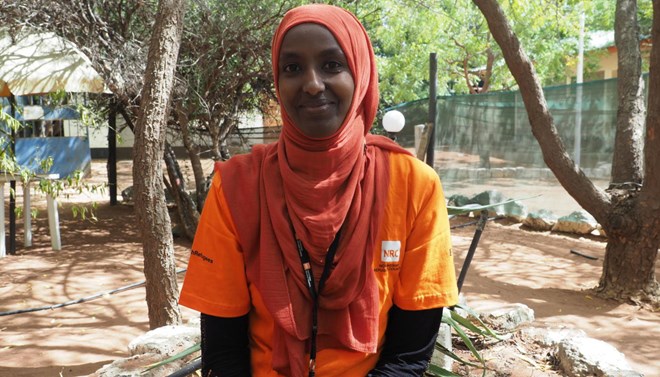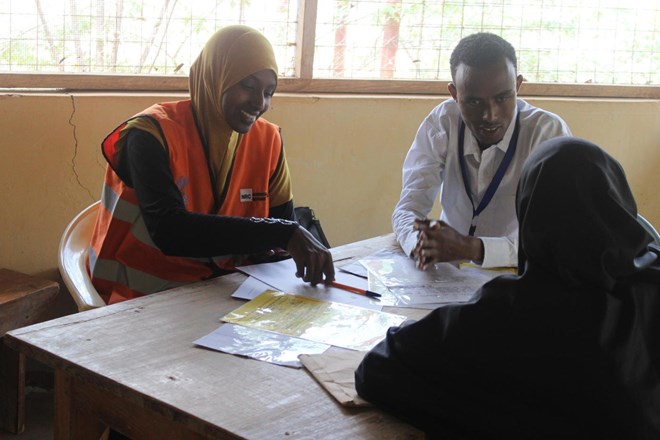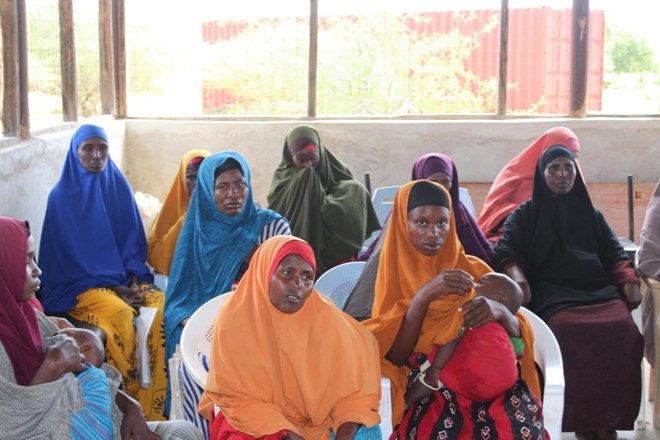
Tuesday May 21, 2019
By Catriona Loughran
 Safo Ahmed (29) gives legal advice and support to refugees in Dadaab refugee complex. Photo: Catriona Loughran/NRC
Safo Ahmed (29) gives legal advice and support to refugees in Dadaab refugee complex. Photo: Catriona Loughran/NRC
Safo Ahmed could have worked for one of Kenya’s top law firms but chose to join the Norwegian Refugee Council instead. Now she offers her legal expertise to those who need it the most.
advertisements
“I studied law at university, and wanted to start my career and work for a private law firm in Nairobi. Lots of my friends at university had the same desires. I am from a rural part of Kenya called Moyale and I always had dreams of living in a big city, where there is lots of opportunity to work hard and dream big,” she said.However, a chance meeting with a college friend, who was doing an internship with NRC, changed all that.
Safo was curious to know more about NRC and why her friend was enjoying so much job satisfaction.
“I remember my friend’s face lighting up when she told me how she was able to help loads of refugees and displaced people gain access to important services and documents. She encouraged me to apply for a job, so I did – and two years later, I have never been happier,” she smiles.
“I thought I wouldn’t last”
Safo is based in NRC’s office at Dadaab refugee complex, which is home to over 200,000 Somali refugees.
The environment is hot and unforgiving, and insecurity is a constant challenge. Safo admits there were times when she asked herself if she was making the right career choice.
“The first few weeks were difficult. I thought I wouldn’t last. The first two or three months, I wished my contract would end, but then when I had the option of going home, I decided to stay on.”
 Safo Ahmed provides counselling for a refugee on legal and civil documentation. Photo: Jean Ndede/NRC
Safo Ahmed provides counselling for a refugee on legal and civil documentation. Photo: Jean Ndede/NRC Birth and marriage certificates: a gateway to a better life
The NRC’s Information, Counselling and Legal Assistance (ICLA) unit offers legal assistance, counselling and information to thousands of refugees every year. Among the most challenging aspects of the work is getting refugees access to legal documents like birth or marriage certificates.
“Some are lucky and get their documents in a matter of months, but others have to wait years. When refugee children are born in Kenya they can get certificates, but the authorities stamp ‘refugee’ in their documents, which can be problematic. Those born in Somalia with no access to certificates cannot use Kenyan services because they are not born here. So, it’s a constant merry-go-round of bureaucracy.”
“There are a lot of children like this and some cannot sit their Kenyan exams because they lack the right certificate. This is very sad because you see so many capable school children unable to get qualifications.”
“We also assist women in getting marriage certs,” Safo continues. “Most of them are going back to Somalia so they are able to claim land and property once they have a certificate to show authorities.”
Safo says there is no better feeling than to see a Somali mother smile and raise her hands to the sky after receiving a certificate.
“It’s overwhelming when you get them their documentation. That certificate is a gateway to a better life. It can get them food, basic items, legal rights and most of all peace of mind. That’s all refugees want.”
 NRC
staff carry out information sessions providing guidance to refugees on
legal and civil documentation, land and property rights. Photo:
Vitalis/NRC
NRC
staff carry out information sessions providing guidance to refugees on
legal and civil documentation, land and property rights. Photo:
Vitalis/NRC Helping women to start their own businesses
NRC also informs refugees about employment law and encourages women to set up support groups so they can take on more civic responsibility.
“We offer support so they can set up their own businesses and become more self-reliant. It’s more direct and more rewarding because refugees want these opportunities. They don’t want to be waiting in queues for food all the time.”
Safo admits it has been an eye-opening experience and says you have to know how to swim away from the never-ending whirlpool of legal bureaucracy.
“Refugees have lost everything and, often, having their documents in order gives them that reassurance that they are a normal citizen,” she says.
A tough environment with rich rewards
“You have to work in tough environments and you need a lot of patience and compassion,” Safo explains. “Lots of doors slam shut in your face at the start, but after a while, you start seeing the results.”
Asked whether she’d swap the surroundings of Dadaab for an air-conditioned office in a tall building in Nairobi, she looks around her and says, smiling:
“Dadaab gets to you. You have all these people that depend on you, and seeing results from the work you do really is so rewarding. I don’t look at my friends’ lives in Nairobi with rose-tinted glasses anymore. This is what I want to do, and it has even inspired me to set up a project in my home town of Moyale and help people in my own community.”